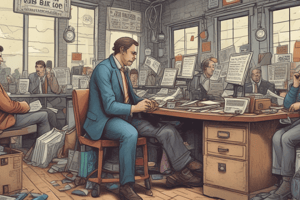Podcast
Questions and Answers
What is the main consequence of inflation?
What is the main consequence of inflation?
- Increasing the purchasing power of money
- Decreasing unemployment rates
- Stable economic environments
- Reducing the purchasing power of money (correct)
How can persistent high rates of unemployment affect the economy?
How can persistent high rates of unemployment affect the economy?
- Enhance wealth creation process
- Reduce inflation levels
- Increase economic growth
- Lead to social issues (correct)
Why is controlling inflation crucial for an economy?
Why is controlling inflation crucial for an economy?
- To encourage hyperinflation
- To decrease job availability
- To reduce fiscal policy
- To maintain stable economic environments (correct)
What do central banks do to regulate inflation levels?
What do central banks do to regulate inflation levels?
How can policies enhancing labor demand impact unemployment rates?
How can policies enhancing labor demand impact unemployment rates?
Which country experienced destabilizing hyperinflation scenarios in the late 2000s?
Which country experienced destabilizing hyperinflation scenarios in the late 2000s?
What is the primary purpose of monetary policy?
What is the primary purpose of monetary policy?
How does fiscal policy function to stabilize economies?
How does fiscal policy function to stabilize economies?
Which pillar supports the expansion of productive capacity and living standards?
Which pillar supports the expansion of productive capacity and living standards?
What is the impact of monetary policy on employment?
What is the impact of monetary policy on employment?
How does rapid yet unsustainable economic growth pose risks?
How does rapid yet unsustainable economic growth pose risks?
What essential components does monetary policy adjust to guide economic decisions?
What essential components does monetary policy adjust to guide economic decisions?
Study Notes
Exploring Macroeconomic Foundations: Inflation, Unemployment, Monetary Policy, Economic Growth, Fiscal Policy
Macroeconomics is a field focused on examining the behavior and trends across entire economies—the aggregates that influence daily life through factors such as inflation, jobs availability, and income distribution. By delving into these fundamental aspects of macroeconomics, we equip ourselves with tools to understand and shape national economies' health. Let's explore each core concept individually.
Inflation
Inflation refers to rising prices for goods and services, causing the purchasing power of money to decrease. Controlling inflation is crucial for maintaining stable economic environments and avoiding destabilizing hyperinflation scenarios like those seen in Germany in the early 1920s or Zimbabwe in the late 2000s. Government agencies such as central banks closely monitor and employ various mechanisms to regulate inflation levels.
Unemployment
This measure assesses the percentage of individuals actively seeking employment but unable to secure paid work within specific time frames. Persistent high rates of unemployment can lead to social issues and decreased economic growth because people lack the ability to participate fully in their nation's wealth creation process. Policies enhancing labor demand and education initiatives aimed at strengthening skills and qualifications help lower unemployment numbers.
Monetary Policy
Manipulating the supply of money and credit controls is known as monetary policy. This instrument allows governments and central banks to guide economic decisions by adjusting interest rates, reserve requirements, and other essential components affecting the quantity of money in circulation. Monetary policy impacts savings, investment, exchange rates, employment, and price stability within an economy. It serves as a potent tool to counteract fluctuations and steer economic activity towards desired goals.
Economic Growth
Gross Domestic Product, or GDP, represents a country's total output of final goods and services produced within its borders annually. Economic growth indicates the expansion of productive capacity and living standards. Steady, sustainable growth is typically preferred; however, rapid yet unsustainable growth poses risks related to resource scarcities and environmental degradation. Encouraging innovation, entrepreneurship, technological advancements, and favorable business climates foster growth.
Fiscal Policy
Comprising taxes and expenditures, fiscal policy functions to manage aggregate demand and stabilize economies. Increasing government spending (expansionary fiscal policy) during downturns encourages consumption and investment, stimulating economic growth. During prosperous periods, contractionary fiscal policy balances budgets by reducing spending or raising revenues, thereby preventing overheating. Optimal deployment of fiscal policy is vital to achieving stable, equitable, and inclusive socioeconomic progression.
These five pillars form the foundation of modern macroeconomics. Their ongoing study provides valuable insights for policymakers attempting to mitigate threats and capitalize upon opportunities, promoting the well-being of peoples worldwide.
Studying That Suits You
Use AI to generate personalized quizzes and flashcards to suit your learning preferences.
Description
Test your knowledge on key concepts of macroeconomics such as inflation, unemployment, monetary policy, economic growth, and fiscal policy. Explore how these pillars shape national economies and influence daily life through this quiz.




